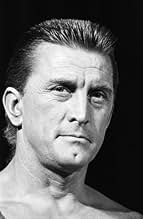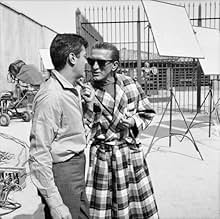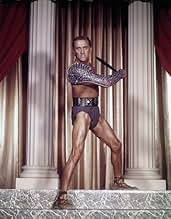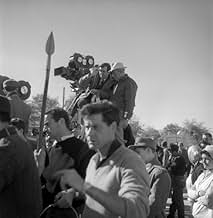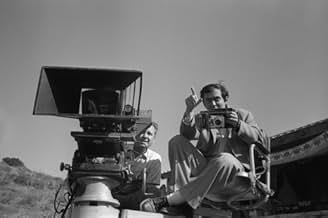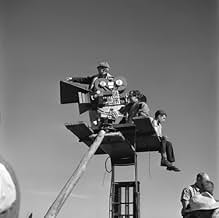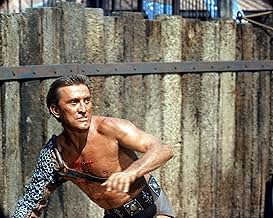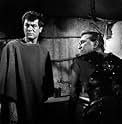La storia del famoso gladiatore, fuggito dalla schiavitù e messosi a capo della rivolta di sessantamila schiavi contro Roma.La storia del famoso gladiatore, fuggito dalla schiavitù e messosi a capo della rivolta di sessantamila schiavi contro Roma.La storia del famoso gladiatore, fuggito dalla schiavitù e messosi a capo della rivolta di sessantamila schiavi contro Roma.
- Vincitore di 4 Oscar
- 12 vittorie e 11 candidature totali
- Dionysius
- (as Nicholas Dennis)
Trama
Lo sapevi?
- QuizStanley Kubrick was brought in as director after Kirk Douglas had a major falling out with the original director, Anthony Mann. According to Sir Peter Ustinov, the salt mines sequence was the only footage shot by Mann.
- BlooperA map of Italy can be seen in Spartacus' camp tent (it is prominently featured in the scenes involving the pirate emissary), which is far too accurate for the times of the movie.
- Citazioni
Herald: I bring a message from your master, Marcus Licinius Crassus, Commander of Italy. By command of His Most Merciful Excellency, your lives are to be spared. Slaves you were and slaves you remain. But the terrible penalty of crucifixion has been set aside on the single condition that you identify the body or the living person of the slave called Spartacus.
Antoninus: [stands up] I'm Spartacus!
[everyone around Antoninus and Spartacus stands up and shouts "I'm Spartacus!"]
- Curiosità sui creditiThe six main cast members are accompanied by an item that represents their character (a chain, a Roman eagle, a wine jug, a couple of hands - one wielding a snake, and a sword).
- Versioni alternativeAfter its premiere the film was heavily cut and wasn't shown in its complete form until 1991, when a restored version was re-released. Among the restored scenes is one where where Marcus Crassus (Laurence Olivier) tries to seduce Antonius (Tony Curtis) in the bath. The soundtrack was damaged, so Anthony Hopkins was called in to dub Olivier's lines. In addition, several scenes of violence preview audiences reacted to negatively were restored, including Crassus bloodily stabbing Draba, Marcellus being drowned in the stew, Spartacus stabbing a Roman soldier in the pool, and several gory shots in the final battle, notably Spartacus lopping off the arm of a Roman soldier.
- ConnessioniEdited into Hercules: Les Contemptibles (1997)
But you will notice that Bryna Productions not only financed SPARTACUS but also an earlier film directed by Kubrick, PATHS OF GLORY (1958). Bryna was Kirk Douglas' film company and, as most filmgoers know, he was the star of both films. Besides having all the money to make the films, Douglas had artistic vision as well. Only three weeks into what would prove to be an incredibly complex and arduous production, Douglas fired venerable director Anthony Mann (RAW DEAL, RAILROADED,THE FURIES, THE NAKED SPUR, THE MAN FROM LARAMIE, MAN OF THE WEST, etc.) from SPARTACUS. With only two days notice, Kubrick was hired to replace him.
Shooting PATHS OF GLORY, Douglas had confined his criticisms and objections to Kubrick's failed rewriting of the script (they went with the original screenplay). Douglas' complaints and artistic influence were far greater on SPARTACUS, much to Kubrick's chagrin. Though the director craved autonomy over every aspect of the film, Douglas would not budge. A tense compromise was reached but ultimately Douglas had the last word. Kubrick saw himself as just a hired gun. And he would never allow himself to be placed in this position again.
Later, both men would complain about the film's outcome and each other. They never made another movie together.
But SPARTACUS is no uneven patchwork of divergent ideas. The film is cohesive and arresting. At the restored version of three hours and eighteen minutes, there is practically no dead footage in the film. Dalton Trumbo's screenplay is surprisingly economical, with sharply drawn characters placed against the sweeping historical majesty and violent sociological tumult of ancient Rome. Quite plainly, the gloriously inventive music by Alex North is among the greatest scores ever written for a motion picture. And despite Kubrick's bad experience, he managed to guide the actors towards creating outstanding work (a best supporting actor Oscar for Peter Ustinov). He even transformed the very real enmity between Laughton and Olivier into an on-screen asset. His other contributions were considerable also (the large scale and power of the battle sequence, for example). In the end, for the film at least, the clash of giant egos proved fortuitous. Recommendations: for greater insight and detail on this and Kubrick's other films I urge you to seek out Jan Harlan's excellent documentary, STANLEY KUBRICK: A LIFE IN PICTURES, and Vincent LoBrutto's exhaustive, highly informative biography, STANLEY KUBRICK. For the producer's views on SPARTACUS and its director, take a gander at Kirk Douglas' very candid autobiography, THE RAGMAN'S SON.
I più visti
Dettagli
- Data di uscita
- Paese di origine
- Sito ufficiale
- Lingua
- Celebre anche come
- Espartaco
- Luoghi delle riprese
- Hearst Castle, San Simeon, California, Stati Uniti(Crassus' villa)
- Azienda produttrice
- Vedi altri crediti dell’azienda su IMDbPro
Botteghino
- Budget
- 12.000.000 USD (previsto)
- Lordo Stati Uniti e Canada
- 1.830.650 USD
- Fine settimana di apertura Stati Uniti e Canada
- 92.162 USD
- 28 apr 1991
- Lordo in tutto il mondo
- 1.846.975 USD
- Tempo di esecuzione3 ore 17 minuti
- Colore
Contribuisci a questa pagina





